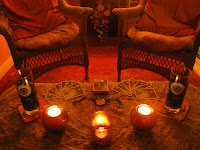
Sleep has fallen away early
And I listen to the gradual sounds
Of the house waking with me.
The eaves and heat pipes creak gently
As the joists and lintels and slates
Yawn and stretch
With the vibrations of the first traffic.
I imagine the pointillism of light
Starting to minutely dapple the last of the night,
As somewhere beyond the park,
The sun is inching up yet again.
A dish clinks in the sink below,
Whilst down in the deeper dark,
Techtonic plates exhale millimetres
In the unfathomable reaches of time.
(2011)
On this particular morning, I’d woken with three first drafts of poems swimming behind my eyes, the lines writing themselves on different pages in my mind. It proved to be a productive spell because I finished all three later that day. One of them was ‘In The Cavern’ (see above), but this, I think, was the best.
I’m more of a man for the sunset than the sunrise, I’m afraid, so I struggled to find a suitable photo for this poem. The one here was taken from the front of our house just after daybreak the other day.





